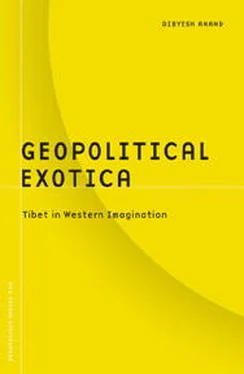The status of Tibet vis-a-vis China before 1951 has been articulated in terms of various concepts, including sovereignty, suzerainty, independence, indirect rule, autonomy, vassalage, protectorate, overlordship, and colony (for a range of views, see Chiu and Dreyer 1989; Government of Tibet in Exile n.d.; Petech 1950; Norbu 1990; Shakabpa 1984; Smith 1996; Van Praag 1987; Wang Jiawei and Nyima Gyaincain 1997; Wang Lixiong 2002). However, for the most part, it is sovereignty that is asserted and contested. On the one hand, the Chinese state marshals arguments buttressing its historical claim of sovereignty over Tibet; on the other, Tibetan exiles and their supporters make counter claims and assert that Tibet was for all practical purposes independent from China. Though both sides mobilize history to make their claims, the concept of sovereignty is often left unproblematized. This is not surprising as sovereignty is an "essentially uncontested concept" (Walker 1990, 159; for different perspectives on sovereignty, see Bartelson 1995; Biersteker and Weber 1996; Hannum 1990; Hinsley 1986; Hoffman 1998; James 1986; Krasner 1999; Shinoda 2000; Weber 1995).
Crucially, the revolutionary communist regime that took over China in 1949 had no qualms about staking claims in Tibet based on a debatable imperial legacy, which it had denounced in other spheres. There was no radical break from the past in making assertions over the boundary of China. The Chinese, who during the nineteenth century rejected the Western mode of international relations as alien, exerted their control over Tibet after 1950 using the absolutist modern European conception of sovereignty. Importantly, in the process it also ignored the different worldviews within which the Mongol and Manchu emperors interacted with Tibet (see Klieger 1994; Norbu 1990; Shakya 1999). Unlike the British, who used "suzerainty" and "autonomy" to designate Sino-Tibetan relations, since 1905 the Chinese have consistently argued that China's position is that of a sovereign and not a suzerain (see Carlson 2004, 2005). At the beginning of the twenty-first century, even though there is no space for "suzerainty" within international law and politics and all the states recognize the Chinese claim of "sovereignty" over Tibet, the pro-Tibet lobby contests this affirmation of sovereignty by highlighting the difference between suzerainty and sovereignty within international law. As Oppenheim argued: "Suzerainty is by no means sovereignty. It is a kind of international guardianship, since the vassal State is either absolutely or mainly represented internationally by the suzerain State" (in Van Praag 1987, 107).
IMPERIALISM AND THE CONSTRUCTION OF MODERN TIBET
The genealogy of the modern idea of sovereignty as it was transplanted in the non-Western world reveals its close connection with European imperialism. Until the first half of the twentieth century, the international community of states was based on a double standard. While the "civilized" world (read as Europe, and later the United States and Japan) had a right to sovereign statehood, the rest of the world was open to various forms of imperial control. The "[d]egree of civilisation necessary to maintain international relations was considered as one of the conditions for statehood" (Hannum 1990, 16). The Tibetan example is typical of how imperial efforts throughout the non-European world were empowered by Western understandings of the non-Western states. Not only did imperial powers actively delegitimize non -Western modes of political interaction but they refused to recognize the intricacies of non-Western interstate relations (see Strang 1996). Within this context, at the beginning of the twentieth century, the traditional Sino-Tibetan relationship was considered by the British to be "irrational" and lacking legitimacy because it did not conform to the modern European ideas of diplomacy. For a large part of the nineteenth century, to the British in India, Tibet was a "forbidden land" ruled by "strange lamas" under some form of Chinese political control. While some, including Bogle, named this control "sovereignty" (Markham 1876, 195), most used the terms "overlordship" or "suzerainty." In one of the first European accounts, the Christian missionary Ippolito Desideri saw Tibet as part of the "Chinese dominion" (De Filippi 1932, 165). On the other hand, Fathers Huc (1982/1851) and Gabet, the "Lamas of the Western Heaven," in the middle of the nineteenth century described the Chinese rule as "nominal" (in Nish 1995, 294). This recognition of Chinese political dominance was based on the presence of Imperial amban (resident) and troops in Lhasa, the role of the Manchu emperors in the recognition of the Dalai Lama and the Panchen Lama, and the Tibetan refusal to articulate Tibet's status in modern terms.
Due to their own familiarity with feudalism and with the Chinese international system of tributary relations (Wiggins 1995), it is not surprising that the British interpreted the Sino-Tibetan relations in terms of suzerainty and a protectorate system. British policy toward Tibet was shaped by conflicting dynamics including the infeasibility of direct colonization, the security of British India's northern frontiers, the conceptualization of Tibet as a buffer state with a strategic location (see McKay 2003), British commercial interests in the Chinese empire, shifting alliances within Europe, and the like (see Norbu 1990). These conflicting interests shifted over time.
Tibet as outside the Modern Geopolitical Imaginary
In the eighteenth century, Tibet was seen as a possible backdoor to China as well as a potential trading partner. [48]There were a few Europeans (mostly Christian missionaries) who had traveled and lived in Tibet and Lhasa before and after the British attempts to establish a relationship in the second half of the eighteenth century. While their accounts fed into the image of Tibet held by the British, their role was merely to arouse curiosity. The main focus of expanding British colonialism was on exploring the possibility of commercial interactions (see Cammann 1951). Even before the first-ever official attempt to establish relations with Tibet through George Bogle, the following observation was made about Tibet (in the Extract of Bengal Secret Consultations of 9 May 1774): "They are represented as a quiet people numerous and industrious, living under a well regulated Government, having considerable intercourse with other Nations, particularly with the Chinese & Northern Tartars, and possessing at home the principal means of Commerce, Gold and Silver in great abundance" (IOR: H/219 1768-84, 336; emphasis added).
This view is bolstered by Bogle (in Markham 1876) as well as Turner (1971/1800). Both official travelers to Tibet also made observations about Chinese influence in Tibet. Bogle in a letter in February 1775 mentions that while Teshoo Lama was influential, the real seat of government was Lhasa, and the "Emperor of China is paramount sovereign"; in another letter he further clarifies:
The Emperor of China is acknowledged the sovereign of the country, the appointment to the first officers in the state is made by his orders, and in all measures of consequences, reference is first made to the court at Pekin, but the internal government of the country is committed entirely to natives, the Chinese in general are confined to the capital, no tribute is extracted, and the people of Thibet except at Lahasa, hardly feel the weight of a foreign yoke. (IOR: H/219 1768-84, 354, 397-98; emphasis added)
Turner, in a letter dated 2 March 1784, points out that in Tibet there is an "acknowledgement of the supremacy of the Chinese government" (IOR: H/219 1768-84, 485). But there was no serious attempt to name Sino-Tibetan relations in precise terms. Representations of Tibet did not feed into political actions. There could be various explanations for why British imperialists did not seek to define Tibet at this moment. The empire in India itself was in the process of initial expansion and consolidation. Large parts of Asia and Africa remained outside European control and hence were seen as open space for inquiry. Tibet did not hold any special value. For the British, India and China did.
Читать дальше












